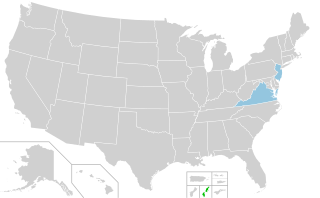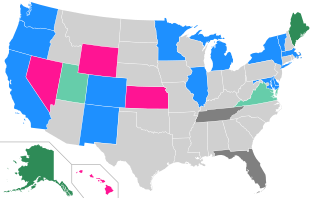Related Research Articles
A write-in candidate is a candidate whose name does not appear on the ballot but seeks election by asking voters to cast a vote for the candidate by physically writing in the person's name on the ballot. Depending on electoral law it may be possible to win an election by winning a sufficient number of such write-in votes, which count equally as if the person was formally listed on the ballot.
Ingrid Blom Sheldon is an American politician who served as the 59th mayor of Ann Arbor, Michigan from 1993 to 2000. A moderate Republican, she served four two-year terms in the post. To date, Sheldon remains the city's last Republican mayor.

The Human Rights Party (HRP) was a left-wing political party that existed in Michigan during the early and mid-1970s. The party achieved electoral success in Ann Arbor and Ypsilanti. It eventually expanded to include several other Michigan cities with large student populations. In 1975, the HRP became the Socialist Human Rights Party, and it later merged with the Socialist Party of Michigan.

Since the 1970s, the college town of Ann Arbor, Michigan, has enacted some of the most lenient laws on marijuana possession in the United States. These include measures approved in a 1971 city-council ordinance, a 1974 voter referendum making possession of small amounts of the substance merely a civil infraction subject to a small fine, and a 2004 referendum on the use of medical marijuana. The passage of the Michigan Regulation and Taxation of Marihuana Act in November 2018 has made recreational marijuana legal not only in Ann Arbor but throughout the entire state.

The 2005 United States elections were held on Tuesday, November 8. During this off-year election, the only seats up for election in the United States Congress were special elections held throughout the year. None of these congressional seats changed party hands. There were also two gubernatorial races, state legislative elections in two states, numerous citizen initiatives, mayoral races in several major cities, and a variety of local offices on the ballot.
Elizabeth Brater is a Democratic former member of the Michigan Senate, who represented the 18th district from 2003 to 2010, and served as the Assistant Minority Leader. Her district included the cities of Ann Arbor and Ypsilanti. She was previously a member of the Michigan House of Representatives from 1995 to 2000.
Gerald D. Jernigan was mayor of the city of Ann Arbor, Michigan, from 1987 to 1991.
Edward Charles Pierce was a politician and physician from the U.S. state of Michigan.

Albert H. Wheeler was an American life-sciences professor and politician in Ann Arbor, Michigan. He became the city's first African-American mayor, serving in the office from 1975 to 1978.

Ranked-choice voting (RCV) is a ranked voting system being used in some states and cities in the United States in which voters may prioritize (rank) their choice of candidates among many, and a procedure exists to count lower ranked candidates if and after higher ranked candidates have been eliminated, usually in a succession of counting rounds. In practice, there are several ways this can be implemented and variations exist; instant-runoff voting (IRV) and single transferable vote (STV) are the general types of ranked-choice voting systems used in the United States.

The 1974 New York state election was held on November 5, 1974, to elect the governor, the lieutenant governor, the state comptroller, the attorney general, two judges of the New York Court of Appeals and a U.S. Senator, as well as all members of the New York State Assembly and the New York State Senate.

The 2008 United States presidential election in Michigan took place on November 4, 2008. It was part of the 2008 United States presidential election which happened throughout all 50 states and D.C. Voters chose 17 representatives, or electors to the Electoral College, who voted for president and vice president.
The politics of Michigan, a competitive state that leans Democratic in Presidential elections, are divided. Michigan is considered part of the Democrats' "Blue Wall." Governors since the 1970s have alternated between the two parties, and statewide offices including attorney general, secretary of state, and senator have been held by members of both parties in varying proportions, though the state currently is represented by two Democratic U.S. Senators. The Republican Party holds a majority in both the House and Senate of the Michigan Legislature. The state's congressional delegation is commonly split, with one party or the other typically holding a narrow majority.
Jeff Irwin is an American activist, progressive and politician serving as a member of the Michigan Senate. A member of the Democratic Party, he served on the Washtenaw County Board of Commissioners from 1999 to 2010, and in the Michigan House of Representatives from 2011 to 2017.

The New York City mayoral election of 1961 occurred on Tuesday, November 7, 1961. Incumbent Democratic Mayor Robert F. Wagner, Jr. won a decisive re-election victory for a third term in office. Wagner defeated the Republican nominee, state Attorney General Louis J. Lefkowitz, and the Citizens Party nominee, New York City Comptroller Lawrence E. Gerosa. Wagner received 51.03% of the vote to Lefkowitz's 34.46%, a Democratic victory margin of 16.57%.

The 2000 San Diego mayoral election was held on Tuesday, November 7, 2000 to elect the mayor for San Diego. Incumbent mayor Susan Golding was ineligible to run for reelection due to term limits.

The 2019 United States elections were held, in large part, on Tuesday, November 5, 2019. This off-year election included gubernatorial elections in Kentucky, Louisiana, and Mississippi; regularly-scheduled state legislative elections in Louisiana, Mississippi, Virginia, and New Jersey; and special elections for seats in various state legislatures. Numerous citizen initiatives, mayoral races, and a variety of other local elections also occurred. Three special elections to the United States House of Representatives also took place in 2019 as a result of vacancies.

The 2022 United States elections will be held on Tuesday, November 8, 2022. During this midterm election year, all 435 seats in the House of Representatives and 35 of the 100 seats in the Senate will be contested. Thirty-nine state and territorial gubernatorial and numerous other state and local elections will also be contested. This will be the first election affected by the redistricting that will follow the 2020 census.

The Cook County, Illinois general election was held on November 6, 2018.

The 2020 Wisconsin Fall General Election was held in the U.S. state of Wisconsin on November 3, 2020. All of Wisconsin's eight seats in the United States House of Representatives were up for election, as well as sixteen seats in the Wisconsin State Senate and all 99 seats in the Wisconsin State Assembly. Voters also chose ten electors to represent them in the Electoral College, which then participated in selecting the president of the United States. The 2020 Fall Partisan Primary was held on August 11, 2020.